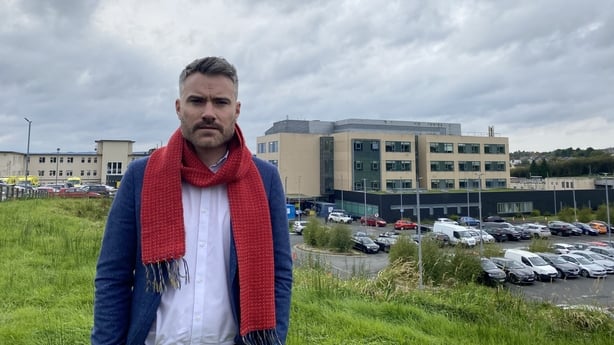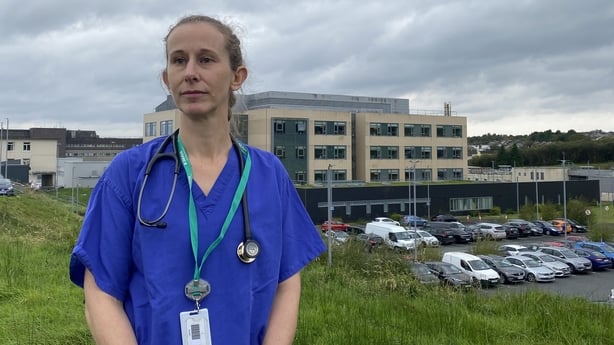Doctors in Donegal have called on the Minister for Health to get into his car and drive to the county to see the situation at Letterkenny University Hospital for himself.
A call by almost 80 GPs in Donegal for urgent action at the Emergency Department at Letterkenny University Hospital has been backed by a group of consultants working there.
The consultants say they share the concerns of the doctors "regarding the clinical risk to patients arising from the deteriorating conditions in the ED and lack of hospital resources".
In letters written to Minister for Health Stephen Donnelly, the GPs and consultants call for the minister and senior officials to step in and have an external review of the ED carried out and an action plan put in place regarding access to the department and acute services.
Dr Padraig McGuinness, a GP based in Fanad Co Donegal and one of the GPs who wrote to Minister Donnelly, said the Minister should get in his car and come to the county to meet with people working on the frontline.
He said the Minister needs to speak to the clinicians in LUH who are saying things like "service collapse" and "tipping point"; speak to the GPs who are scared to send their patients into the hospital, and speak to hospital management with the doctors and create a plan with solutions.
Consultant Anaesthetist at LUH, Dr Louise Moran, described the situation in the Emergency Department as a crisis.
Three years ago, she said, 80% of patients were seen in under six hours, now it is less than 50% and over a quarter have to wait more than nine hours to be seen.
Dr Moran said when they do get seen, they have to wait on trolleys, and the trolley wait in Letterkenny is about 25% more per capita than at Limerick University Hospital.
Dr Moran said that Letterkenny desperately needs more beds and more funding. Funding at LUH is about half per capita of what is received by some similar hospitals around the country.
She said she appreciates that Saolta is trying to address the situation, but she said it is not enough that they are talking about 90 more beds for 2030; we need 90 beds now, not in 2030, she said.

Dr McGuinness agreed that LUH has been "chronically underfunded", and he said we, as GPs, are no longer willing to stand by and watch patients suffer adverse outcomes versus the rest of the country because we are not getting our fair share of the pie.
Dr McGuinness said they are asking for three things: an external review of the ED, extra resources, and to get our medical assessment unit up and running, something he said could be done this week.
The ball is firmly in the Minister's court, Dr McGuinness said, "get in your car and come down to meet us."
In their letter to Minister Donnelly the GPs involved say that they acknowledge the work that is being done locally.
They say they welcome the rapid access zone in the ED for assessment and the new clinical arrangements for seeing paediatric patients in the department among a number of other actions. However they say that "efforts are being made, but the ambition, the speed and the delivery is not good enough."
In simple terms, the letter says, "the system is broken. We no longer have faith that the current system can be fixed and appropriately managed without outside intervention , support and resources."
Supporting the calls for an external review, the group of 11 consultants working at LUH say that the ED there is one of the largest in Ireland with almost 150 patient presentations a day, around 50 of whom are admitted.
"The condition of our services, many of which are under extreme pressure, has been repeatedly brought to the attention of local hospital management, Saolta Group, Department of Health and various ministers over the last number of years."
The consultants say that ED waiting times, "the most visible sign of a hospital in distress, have deteriorated quite dramatically since 2020".

In a statement, LUH and the Saolta Group say they acknowledge the challenges facing the hospital and the last 18 months has seen a "very significant increase" in demand on services and infrastructure.
It said the hospital has seen a 10% increase in ED attendances from January to August 2023 versus the same period in 2022.
The statement continued that LUH and and group are working on a range of investment and development projects, including an extension to the ED, which it said is being progressed, and increased staffing for the department.
Tony Canavan, Chief Executive of the Saolta Hospital Group told RTÉ's News at One that this "is not the type of patient care we want to deliver", adding that it can impact the outcome for patients.
Mr Canavan said there has been a number of interventions put in place to help with the "efficiency" in the ED at Letterkenny University Hospital which allows for some people to be admitted and discharged more quickly. He said it is working well, reducing the amount of time people are waiting.
However, he said the core issue is making sure that people who need to be admitted get a bed as quickly as possible.
He said GPs in the area want to be part of the planning in the health service across the region and believes that is the solution to this problem. "We are absolutely up for that challenge.... and to further improve the services we are providing."
He also said the number of people attending hospital over the age of 75 has risen, adding that they often tend to stay longer as they need more care.
Speaking on the same programme, Dr Ciarán O Fearraigh, a GP in Stranolar, said they are looking for an external review of the situation at Letterkenny University Hospital in the hope of finding a resolution.
"It has come to the fore at the minute because of recent excessive waiting times in the Emergency Department there and the experiences that our patients are telling us about. And the associated poor outcomes that we know are the consequences of these excessive waiting times."
He said the problems in the ED are partly due to lack of access to other basic services, including waiting for outpatient services. He said patients saying they would rather get treated in the community rather than in the hospital because of the concerns they have over the care and waiting times.






